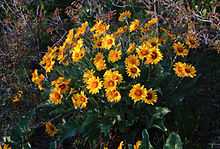Balsamorhiza sagittata
| Balsamorhiza sagittata | |
|---|---|
 | |
| Scientific classification | |
| Kingdom: | Plantae |
| (unranked): | Angiosperms |
| (unranked): | Eudicots |
| (unranked): | Asterids |
| Order: | Asterales |
| Family: | Asteraceae |
| Tribe: | Heliantheae |
| Genus: | Balsamorhiza |
| Species: | B. sagittata |
| Binomial name | |
| Balsamorhiza sagittata (Pursh) Nutt. | |
Balsamorhiza sagittata is a species of flowering plant in the sunflower tribe of the plant family Asteraceae known by the common name arrowleaf balsamroot.
Distribution
The plant is native to much of western North America from British Columbia to California to the Dakotas. It grows in many types of habitat from mountain forests to grassland to desert scrub.[1][2] It is drought tolerant.[3]
Description
This is a taprooted perennial herb growing a hairy, glandular stem 20 to 60 centimeters tall. The branching, barky root may extend over two meters deep into the soil. The basal leaves are generally triangular in shape and are large, approaching 50 centimeters in maximum length. Leaves farther up the stem are linear to narrowly oval in shape and smaller. The leaves have untoothed edges and are coated in fine to rough hairs, especially on the undersides.[4] [5][6]
The inflorescence bears one or more flower heads. Each head has a center of long yellowish tubular disc florets and a fringe of bright yellow ray florets, each up to 4 centimeters long. The fruit is a hairless achene about 8 millimeters long. Grazing animals find the plant palatable, especially the flowers and developing seed heads.[7]
.jpg)
Uses
Culinary and medicinal
All of the plant can be eaten.[3] It can be bitter and pine-like in taste.[8]
Many Native American groups, including the Nez Perce, Kootenai, Cheyenne, and Salish, utilized the plant as a food and medicine. [9] [7] The seeds were particularly valuable as food or used for oil [10]
Symbols
Under the name Okanagan Sunflower, it is the official flower emblem of the city of Kelowna, British Columbia, Canada.
References
- ↑ Sullivan, Steven. K. (2015). "Balsamorhiza sagittata". Wildflower Search. Retrieved 2015-02-07.
- ↑ "Balsamorhiza sagittata". PLANTS Database. United States Department of Agriculture; Natural Resources Conservation Service. 2015. Retrieved 2015-02-07.
- ↑ 3.0 3.1 "Arrow Leafed Balsamroot Wildflower".
- ↑ Klinkenberg, Brian (Editor) (2014). "Balsamorhiza sagittata". E-Flora BC: Electronic Atlas of the Plants of British Columbia [eflora.bc.ca]. Lab for Advanced Spatial Analysis, Department of Geography, University of British Columbia, Vancouver. Retrieved 2015-02-07.
- ↑ Giblin, David (Editor) (2015). "Balsamorhiza sagittata". WTU Herbarium Image Collection. Burke Museum, University of Washington. Retrieved 2015-02-07.
- ↑ "Balsamorhiza sagittata". Jepson eFlora: Taxon page. Jepson Herbarium; University of California, Berkeley. 2015. Retrieved 2015-02-07.
- ↑ 7.0 7.1 Forest Service Fire Ecology
- ↑ Vizgirdas, Ray (2006). Wild Plants of the Sierra Nevada. Reno: University of Nevada, Reno. p. 185.
- ↑ University of Michigan - Dearborn, Native American Ethnobotany: Balsamorhiza sagittata
- ↑ Moerman, Daniel (2010). Native American Food Plants: An Ethnobotanical Dictionary. Portland, Oregon: Timber Press. pp. 62–63.
External links
| Wikimedia Commons has media related to: |
 Data related to Balsamorhiza sagittata at Wikispecies
Data related to Balsamorhiza sagittata at Wikispecies- Calflora Database: Balsamorhiza sagittata (arrow leaved balsam root, arrow leaved balsamroot, arrowleaf balsamroot)
- Flora of North America
- Northernbushcraft.com: Identification and edible parts of Balsamorhiza sagittata.
- Balsamorhiza sagittata — UC Photos gallery